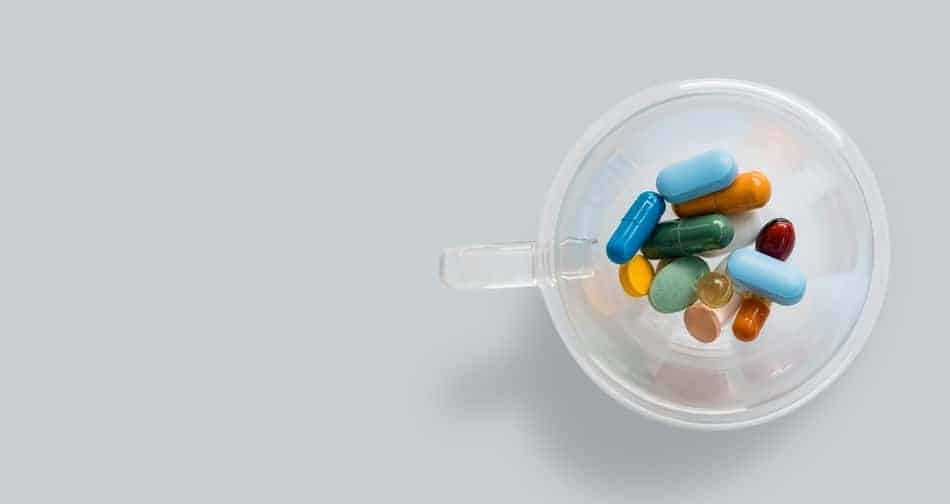If you’re counting calories then you’re probably wondering does the vitamins or supplements have calories. If so, should you be counting calories from vitamins?
You shouldn’t count calories from vitamins because in vitamins or multivitamins there are almost zero calories. Some of the sports drinks that contain vitamins have some calories, but if you’re taking multivitamin pills you should not worry about the calories.
But it all comes down to reading labels. Because there is a difference between vitamins as a product and products enriched with vitamins that also have calories.

Do Vitamins Make You Gain Weight?
Vitamins don’t make you gain weight because pure form vitamins don’t have any calories. Products that are enriched with vitamins like energy drinks, sports drinks, cereals, sports supplements, and meal replacement powders that contain calories can make you gain weight.
Listen.
There is a big difference between vitamin water, vitamin juice, or simple vitamins.
Taking one multivitamin each day will help you balance your vitamins and minerals ratio, but it won’t make you gain weight.
The only way to gain weight from vitamins is through high-calorie drinks that also have vitamins in there. Gatorades, Powerades, Lucozades, Red Bulls, etc.
Taking vitamin pills won’t make you add extra pounds, but it can help you feel better, especially if you have a monotonous diet or you’ve been taking some antibiotics for a long period of time.
So if you’re counting calories and you’re wondering about should you include vitamins in your calculations, I will stop you right there.
Counting calories can get overwhelming quite quickly. And worrying about all the details like vitamins will give you a headache.
Do Vitamins Make You Feel Better?
Vitamins make you feel better because having an optimum balance of vitamins leads to body homeostasis. Vitamins are responsible for all of the body functions, and if you’re having a monotonous diet, in the long term it can lead to some deficiencies, therefore, multivitamins make you feel better.
But it doesn’t mean they work as coffee. When you take a multivitamin you won’t “feel” anything.
To notice a difference it usually takes 3-6 months. Because it’s building gradually, it’s very hard to spot the difference right away.
And if you’re diet is made of a variety of different foods, you may not feel a huge difference. The only moment you notice the difference is when you stop taking them.
It’s like with taking BCAA or protein powder. Every time when I take BCAA after workout cannot feel that I get stronger. But somehow, when I stop taking it I can feel the drop in my energy.
You don’t know if its working until you stop taking it.
Do Vitamins And Minerals Have Calories?
Vitamins and minerals don’t have any calories. The only sources of calories are carbohydrates, proteins, fats, and alcohol. All of the vitamins and minerals are essential for the body to function properly, but they don’t provide any energy in the form of calories.
A calorie is a unit of energy. The only sources with calories in our diet are macronutrients. That’s why they are called macronutrients because they are needed in large quantities, and they provide energy.
Macronutrients are carbohydrates, proteins and fats.
On the other side, you have micronutrients. Those are the vitamins and minerals. They don’t give us calories and we don’t need them is such a great amount on a daily basis. But they are important.
Do Vitamins Provide Energy?
Vitamins don’t provide energy directly because they don’t have any calories. However, vitamins play a key role in creating enzymes and coenzymes in the transformation processes of macronutrients (carbohydrates, fats, and proteins) into cellular energy in the form of ATP.
Which basically means vitamins and minerals are like managers. They manage the system and make sure everything works correctly. Where calories are like workers that delivers horse power to the system.
So without vitamins we wouldn’t be able to even digest our food because for digestion we need enzymes. And enzymes are made thanks to the vitamins and minerals.
Vitamins play a key role in all of the body processes. From digestion, nutrient transportation to even muscle contraction. All the steps require vitamins and minerals. Here are some of the most important roles of vitamins.
Thiamine (B1)
- Manufacture DNA
- Manufacture blood cells
- Manufacture hydrochloric acid
- Plays a role in our appetite
Riboflavin (B2)
- Release energy from carbohydrates
- Manufacture niacin
- Antioxidant
- Oxygen distribution
Niacin (B3)
- Manufacture enzymes
- Play a role in the nervous system
- Play a role in the digestive system
- Important for healthy skin
Pantothenic Acid (B5)
- Needed for metabolism
- Manufacture enzymes
Pyridoxine (B6)
- Needed for protein synthesis
- Needed for metabolism
- Manufacture blood cells
Biotin (B7)
- Needed for metabolism
- Manufacture enzymes
Folate (B9)
- Manufacture DNA
- Manufacture blood cells
Cobalamin (B12)
- Play a role in the nervous system
- Cofactor for methionine
- Manufacture blood cells
Vitamin C
- Needed for protein metabolism
- Needed for immune health
- Antioxidant
- Needed for iron absorption
Vitamin A
- Needed for vision
- Needed for healthy skin
- Antioxidant
- Play a role in the immune system
Vitamin D
- Needed for calcium absorption
- Bone growth and development
- Needed for the immune system
Vitamin E
- Needed for cellular transportation
- Antioxidant
- Needed for cellular membranes
Vitamin K
- Needed for blood coagulation
- Bone growth and development
- Carboxylation of bones and soft tissues
Conclusion
You cannot gain weight from taking vitamins. Also, when you’re counting calories you should not include vitamins and minerals in your daily calculations.
Vitamins and minerals doesn’t provide any energy, therefore, you should calculate them in your calorie numbers.
